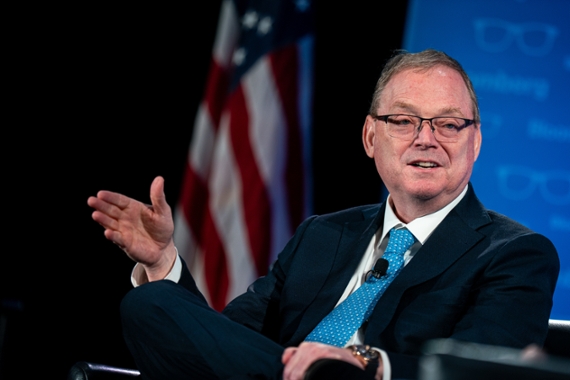|
|
 
Losing a colleague is devastating. But when you lose that colleague to suicide, it's like an earthquake has hit your world. Employees and managers, stunned by grief, wonder what signs they missed and what they could have done to help. Today's story from Training Magazine walks you through smart, practical steps for addressing this tough situation. Also in this issue: ✅ Gen Z hits back at criticism about its work ethic ✅ How you might unknowingly sabotage your team
✅ "Digital friction" causes frustration, hampers productivity
|
|
|
|
|
Cyber threats evolve as fast as technology itself. Join us December 2 at 2PM EST for an in-depth look at the innovations shaping cybersecurity in 2026. Learn from experts how to strengthen your systems, anticipate new risks, and lead with confidence in a changing digital world. Register now. |
|
|
|
|
|
 
 |
| (Bloomberg/Getty Images) |
White House economic adviser Kevin Hassett noted that the job market is currently sending mixed signals. While he highlighted strong performance in output markets, Hassett pointed out that indicators from the labor market are less clear, suggesting uncertainty about future employment trends. "I think that there could be a little bit of almost quiet time in the labor market because firms are finding the AI is making their workers so productive that they don't necessarily have to hire the new kids out of college," Hassett said.
|
|
|
|
|
Retailers face labor shortages, rising customer expectations and unpredictable supply chains, which drive them to reinvent their operations. With mobile technology, retailers can provide real-time visibility, contactless payments, digital receipts and loyalty programs. This paper explores how mobile solutions transform retail operations and engage consumers. |
|
|
|
|
|
 
| |
 |
| (Goodboy Picture Company/Getty Images) |
Generation Z has faced criticism from older employees as it enters the workforce, with detractors describing young workers as lazy and entitled. This phenomenon is not new, as millennials faced similar scrutiny when they entered the workforce, but industry experts say that Generation Z differs from previous generations in prioritizing flexibility and well-being over traditional career goals. Nadya Okamoto, co-founder of August, notes that Generation Z excels in roles such as social media marketing, which did not exist 20 years ago, and Adam Grant, an organizational psychologist at the University of Pennsylvania's Wharton School, says companies that fail to adapt to Generation Z's values risk losing out on performance and innovation.
Kanoe's take. I get it. My daughter is a Gen Zer and doesn't care for sweeping criticisms. She acknowledges that some of the accusations are true -- that some of her peers are "annoyingly entitled" -- but dislikes the generalization. "That's just dumb. Obviously, not everyone is the same. It's a people thing. Some people are entitled. Some people are lazy. But I'm not. Zach's not. Anna's not. Don't put me with the idiot people. I know how to work!" she said, indignantly.
She's right that people should be assessed on an individual basis. We back ourselves into a dark corner when we judge and hire based on generational markers.
Matt's take. I don't have much to add here. As a millennial, I heard many of the same critiques for years until Gen Z became a more fashionable punching bag. I recall being very skeptical about some younger folks hired right out of college, but they turned out to be excellent -- after receiving the proper training and support. On the other hand, I've worked with people my age (and much older) who had astonishing levels of entitlement. Give young people a chance (and the support they need). They might surprise you.
|
|
|
| Free eBooks and Resources |
|
 
|
Employers and employees have different perspectives on workplace safety, with employees more concerned about mental health, according to a report from Pie Insurance. In regard to AI's influence on safety, 64% of employers say it will improve safety, while 23% of employees agree.
|
|
|
|
Comprehensive paid leave policies are a business necessity, not just a social issue, writes Sparrow CEO Deborah Hanus. Most company policies focus on short-term parental leave while Hanus argues for including a broader range of scenarios, such as elder care, medical issues, pregnancy loss and domestic violence. Without adequate leave policies, employees may be forced to make difficult choices between their job and their family, leading to increased stress, low morale and higher turnover.
|
|
|
| Strategies for Success from TrainingMag.com |
| | | |
